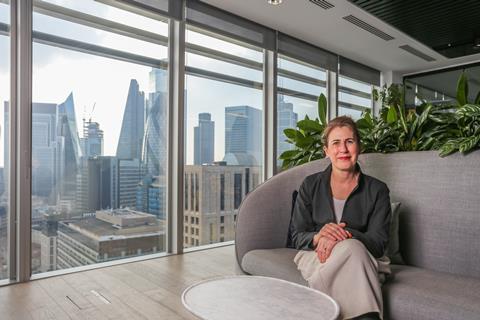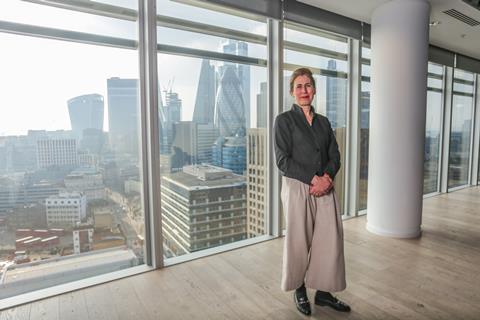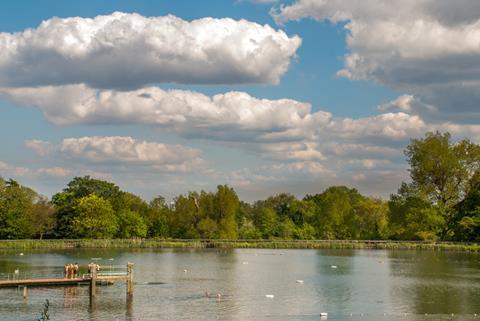The firm’s boss of building and places talks to Dave Rogers about that scheme, that takeover and why the industry needs certainty to thrive

“You can take the girl out of Chatham, but you can’t take the Chatham out of the girl.”
Jo Streeten is talking about her recent battles with the local kids in the area of north London where she lives. Her house, and others, have been egged recently and she has had enough. “We came under a consolidated egg attack on our road. I was found haring down the road, shouting all sorts of language.”
She thinks for a moment, before adding: “You do get that sort of fear in London. Do you go out and confront them? Or do you worry whether they’ve got a knife or a bigger brother? But they were quite young. We found them in the local shop rearming. We said to the shopkeeper, ‘could you at least stop selling them eggs?’ ”
If you think this points to someone who does not suffer fools, then you would be right. Streeten went to a grammar school – Rochester Grammar, an all-girls school in her native Kent which she did not much like – spent 18 years at the BBC and is now in charge of around 4,500 people having been made the managing director of buildings and places at Aecom for Europe and India 18 months ago.
She has now been at Aecom nearly as long as she was at the Beeb. “I watched a programme when I was 14 – Behind the Scenes at the BBC – and it looked like a fantastic place to work.”
She says she was never going to be an actor or a singer or a presenter, maybe most people’s idea of what working at the BBC entails, so instead she plotted another way in. “I was at a careers fair and the BBC had a stand. I said, ‘what do I need to do to work on projects at the BBC?’ and they said, ‘go and do a degree in electrical and electronic engineering’. I was into maths and physics and, ever obedient, that’s what I did at King’s College.”
Later on, she saw a job advertised at the BBC, applied for it and – as luck would have it – the person who handed her his card at the careers fair was on the interview panel. “I said to him, ‘you told me to do this degree and I have’.” She got the job and at 21 became a project engineer.

She admits that she must have bumped into some well-known people during her time there, but she isn’t sure who. “My daughter is one of those who can spot famous people,” she says. “I wouldn’t notice.”
Her time at the BBC was defined by the Portland Place scheme, the headquarters building located just off Regent Street called Broadcasting House and which houses the BBC’s news and journalism departments. It appears nightly on the BBC’s 10 o’clock news show.
Having moved into the BBC’s property division, she led on the redevelopment of Broadcasting House and helped to run the architectural competition along with Broadgate developer Stuart Lipton and Ricky Burdett, later to become chief architectural advisor at the London 2012 Olympics. They eventually settled on a design from the late Sir Richard MacCormac, whose MJP Architects beat pitches from Will Alsop, Eric Parry and Stanton Williams.
“It was a long project and challenging,” Streeten concedes. MacCormac left the job as costs spiralled and Sheppard Robson was brought in to finish things off with the scheme officially opened by the late Queen in 2013.
Streeten had gone by then, deciding to swap being a client for being a consultant. “I was at that age where I thought, if I don’t do it now, then I never will.” This was 2007.
“Everything looked great in the world,” she laughs. She went off to have her second child, a boy, came back from maternity leave six weeks later to find the world was in the middle of a financial crisis.
>> See also: Why Alinea turned its back on independence and signed up with T&T
The company she left the BBC for was called Savant, a project manager and cost consultant which had around 60 people in London and who Streeten knew from her days on the Broadcasting House scheme. She joined, she says, because she was curious for a new challenge.
“I have been driven by interesting projects and people. It would have been more interesting projects with the BBC doing things I knew, so I was very interested and intrigued by looking at the whole plethora.”
She adds: “Having seen both sides, I think you get more freedom and variety on the consultancy side. There is a great range there which I find interesting.”
Savant, which had a big presence in Europe, was bought in 2009 by Aecom, one of several acquisitions made by the US firm around that time with the big one being Davis Langdon.
Streeten worked on the Davis Langdon deal as part of a team carrying out due diligence on the business a couple of months beforehand.
“Emotions ran very high,” she says of the takeover. “It was a hard acquisition for Aecom. [Davis Langdon] was a very cherished brand and so, therefore, its acquisition was painful. I think the perception was that this anonymous Aecom had taken over this jewel.”
What was the impact of that deal? “Well, there are several more cost consultancies in the market than you had before,” she deadpans – a reference to the number of firms such as Alinea – itself now owned by Turner & Townsend – and Core Five that emerged in its wake.
“I think we have maintained a lot of the good legacies of Davis Langdon, but you have to present it as Aecom. We still have people from that time but the difference is the diversity of the business across the piece. We are an at-scale organisation.”
I think you get more freedom and variety on the consultancy side. There is a great range there which I find interesting
Aecom bought Davis Langdon to expand into the UK market, especially the one in London, and Streeten reels off some of the jobs it is working on in the capital: 1 Undershaft, the Eric Parry tower which will be the tallest in the City; British Land’s development at Canada Water; the new Moorfields Eye Hospital, Oriel, in Camden; Parry’s Salisbury Square scheme, the so-called Justice Quarter, off Fleet Street; and the revamp of the Barbican Centre in the City.
The firm also works every year on the Serpentine pavilion project, which showcases the talents of architects who have never worked in the UK before. Her first was the 2008 version, designed by Frank Gehry.
“You’ve got to have a passion for the built environment and a passion for its transformation effect,” she says. But she admits: “The further [higher] I get, the less you touch the detail of the projects.”
Despite such an impressive list of jobs, and the fact that 850 staff are based in the capital, London is not quite the banker for Aecom that many might assume. “There are some challenges around big schemes in London – affordability, planning and other issues. It’s not in trouble, but it’s certainly not the growth engine we see at the moment.”

Instead, health work and, especially, defence are on the rise. “We can flex depending on where the market sees itself. We will continue to see investment in defence and I don’t anticipate that will change, given the geopolitical situation.”
Streeten does not expect to see huge growth this year, given the forthcoming general election, with firms already looking at 2025 for workloads to tick up again. “I think it will be subdued for the rest of this year,” she adds. “To attract people into the industry, we need certainty [of work].”
Speaking of which, Aecom is working with Laing O’Rourke on the HS2 station at Birmingham Interchange and, like most, Streeten is exasperated with the government’s chopping and changing on the scheme. “We were disappointed it was stopped.”
As well as the UK election, she also has to contend with one in India where the firm has 700 staff and offices in Delhi and Mumbai. She made her first trip to the country earlier this year and says the commercial and tech sectors there have the potential to be huge.
She was shocked at how polluted Delhi was, but says: “Here [in the UK] we’re retrofitting already developed infrastructure but, over there, they can develop a greener infrastructure from scratch.”
To attract people into the industry, we need certainty [of work]
She travels overseas a couple of times a month and goes to the firm’s offices in Spain, Germany and Poland as well. “Everything in life is about broadening your horizons,” she adds.
She says more needs to be done to attract women into the industry but believes things are improving. One unexpected outcome of covid was, she adds, how it shifted attitudes towards childcare and men.
“I’ve watched men with young children come into work completely shattered because they’ve been up four times in the night. It’s not just a female issue.
“Covid did many bad things but, before, if you were a man, and you were nipping off early to do the pick-up, people might say, ‘what time do you call this?’ It was said in a jokey way but that has all changed.”
Like many people, she has been concerned about some of the firms that have fallen into administration in the past year. “It comes back to certainty – we need more of them to survive and do well.”
Inflation has been a big problem for contractors, she adds. “They’ve bought at the wrong price.”
Aecom’s recently published annual survey of London’s main contractors revealed that many are scrambling to fill order books, with competition hotting up in the face of falling workloads.
But Streeten says the experiences she and others learnt during the financial crash in 2007 and 2008 should stand the industry in good stead. “In those six weeks [of maternity leave] the world had fallen apart. But the financial markets aren’t broken as they were then.
“Rumours abound and they are always concerning, depending on which contractors or consultants you have on a project. But we learnt a lot during that time [2007-08] and the key is not to respond to the short-term panic and respond to the long view instead.”
Watching the 10 o’clock news and wild swimming: The punctuation marks in Jo Streeten’s schedule
A self-confessed news junkie, Jo Streeten tries to watch the 10 o’clock news on the BBC every night. “I can still feel the pain of the value engineering exercises [when I tune in],” she quips. “For me, the 10 o’clock news is a punctuation mark in my day.”
Her other great punctuation mark is a weekly swim in the ponds at Hampstead Heath. She usually goes on a Saturday or Sunday morning in all weathers. “I love it, it clears the head,” she says.
Her 27-year-old daughter joins her. “It’s a magical place. There are moments when it’s iced over and you’re swimming in a bit of it.”
Her daughter works in television while she thinks her 15-year-old son will go into landscape architecture. “He’s really into plants,” she says. “You look at his computer and, like any 15-year-old, you wonder what you’re going to find… but mainly it’s plant porn.”

She ran the London marathon in 2005 and her training runs would take her from Broadcasting House up to Kenwood House on the Heath. She once got overtaken in a race by someone with a fridge on his back with the legend “A fridge too far” on his back. “It was completely demoralising,” she admits.
Running runs in her family, however, as her mother competed in both the 1952 and 1956 Olympic Games. She ran the 80m hurdles but would have liked to have been a high jumper, only they didn’t have any high jump coaches in Bradford, where she grew up, at the time.
She later became a schoolteacher while her father was Tony Ward, who died in 2010, and was a former athletics administrator and the first press officer for British athletics during its golden era in the 1980s and 1990s. He also ghosted sprinter and 1992 100m Olympic champion Linford Christie’s autobiography.
Pauline, her mother, and Ward never married although, Streeten says, they had a relationship lasting several years “of which I am the result. He was a lovely man, I had enough contact with him.”
As a former Olympian, her mum was invited to watch the final of her equivalent event at London 2012. Needless to say, for a woman born in 1934, the reduced price of £30 or £40 a ticket was still astonishingly high.
“I’m not paying that,” she said to her daughter. “I told her the tickets were like goldust. She went with my daughter in the end. She was blown away by it.”


























No comments yet